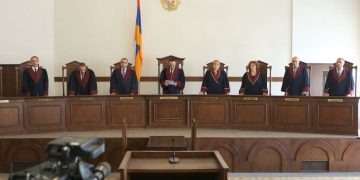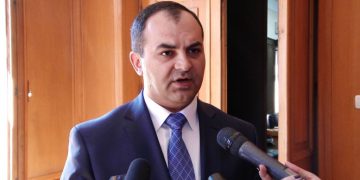During the “Public Discussion” program of the Public TV Company of Armenia on December 18, Tigran Khzmalyan, President of the European Party of Armenia, made a number of manipulative and false claims.
The Fact Investigation Platform has fact-checked the claims that can be refuted.
EU observers have not been in Lachin
Khzmalyan first announced that the EU observers stationed at the Armenian-Azerbaijani border entered the Lachin corridor.
“In the last few hours, we heard that EU observers, who are involved in a completely different operation and by and large have nothing to do with Artsakh [Nagorno Karabakh – Ed.], appeared in the territory of the Corridor. […] They received an order and entered the Corridor unexpectedly for many,” Khzmalyan said.
However, in reality, on December 16, the EU observers visited the Goris-Stepanakert road, but did not enter the Lachin Corridor, as Khzmalyan claimed. On December 17, Toivo Klaar, EU Special Representative for the South Caucasus and Crisis in Georgia, announced this on Twitter.
“There’s a video circulating about an EUMCAP patrol observing the road leading to the Lachin Corridor. The patrol was then at a checkpoint about 1.2 km from the border of Armenia and Azerbaijan. EUMCAP, in line with its mandate, operates exclusively on Armenian territory and did not enter the Corridor,” he wrote.
By the way, during the same program, Khzmalyan also stated that the observers “passed through the Lachin Corridor”.
The mission will not be extended
In response to the remark by political scientist Suren Surenyants, one of the guests of the same program, that the observers will end their mission on the Armenian-Azerbaijani border on December 19, Khzmalyan countered that they will be replaced by other observers.
“No, a new team will come, the French Foreign Minister has said that,” Khzmalyan insisted.
In fact, it was already known on December 12 that the EU will not extend the mandate of the European Union’s observation mission in Armenia, which ends on December 19.
This was announced by the High Representative of the European Union for Foreign Affairs and Security Policy, Josep Borrell. “Nevertheless, in order to maintain our credibility as a facilitator of the dialogue between Armenia and Azerbaijan, a team will be deployed to Armenia in order to plan a possible civilian mission to be launched, in case of agreement, for next year,” Borrell said.
As for the statement of the French Foreign Minister, to which Tigran Khzmalyan refers, it was made earlier, on December 7. That day, during the question-and-answer session in the French Parliament, Foreign Minister Catherine Colonna only announced that it is necessary to extend the period of the observation mission.
“It should be extended as much as necessary. This is our belief, this is also the desire of the Armenians,” stated the French Foreign Minister.
Only the ECHR has set a deadline
According to another assertion by Khzmalyan, the West has given Azerbaijan a deadline. “…In recent days, we have heard ultimatums from the United States, the European Union, the European Court, the European Court of Human Rights, the United Nations, after all. And that ultimatum is set for Monday, December 19, at 19:00 Yerevan time.”
It is not clear what ultimatum Tigran Khzmalyan is referring to, but regarding December 19, only the December 15 decision of the ECHR is known. With this, the European Court gave Azerbaijan time until December 19 at 19:00 to send a response regarding the request submitted by Armenia.
It should be reminded that the Representative of the Republic of Armenia on International Legal Matters applied to the ECHR the previous day, on December 14, demanding to apply interim measures against Azerbaijan and to oblige the latter to unblock the Lachin Corridor.
As for the other actors mentioned by Khzmalyan (USA, EU, UN), they did not present ultimatums to Azerbaijan with any official statement.
Kosovo cannot be “besieged“
During the debate, Khzmalyan also referred to the events taking place in Kosovo in the context of blocking the Lachin Corridor.
“Have many people noticed that at the moment of this blockade, in those days and hours, Kosovo was also besieged, and it did not occur to anyone that there would be a massacre, a slaughter, a genocide there. No. Why is there such a danger in Artsakh [Nagorno Karabakh – Ed.] and not in Kosovo? There is one reason, only one, because… NATO troops are standing in Kosovo with a Western mandate as peacekeepers with a UN mandate, and Russian invaders are standing in the territory of Armenia, in Artsakh [Nagorno Karabakh – Ed.]…” he said.
In reality, Kosovo cannot be blockaded primarily because of its geographical location, because, in addition to Serbia, it borders 3 other countries: Albania, North Macedonia and Montenegro. Meanwhile, after November 9, 2020, Nagorno Karabakh borders only Azerbaijan, and the connection with Armenia is ensured only through the Lachin Corridor, which was blocked by Azerbaijanis posing as “eco-activists” on December 12. Therefore, the comparison between the blockade of Nagorno Karabakh and the events in Kosovo is inappropriate.
As for the “blockade” of Kosovo mentioned by Khzmalyan, in recent days, indeed, tension has arisen in Kosovo again, but the reason is the arrest of a former Serbian police officer in the north of Kosovo on December 10.
Since 1999, a mission consisting of 3762 peacekeepers has been operating in Kosovo under the mandate of the United Nations.
Besides, peacekeeping missions with a UN mandate have not always guaranteed the safety of the population. Thus, during the genocides in Rwanda in 1994 and in Srebrinica (Bosnia and Herzegovina) in 1995, UN peacekeeping missions were operating in those countries.
Thus, Tigran Khzmalyan, the President of the European Party, has made a number of false statements. The mission of the EU observers to the Armenian-Azerbaijani border has not been extended, the EU observers did not enter the Lachin Corridor, the international organizations did not present an ultimatum to Azerbaijan regarding the lifting of the blockade of Lachin, and comparing the events around Kosovo and Nagorno Karabakh is a manipulation.
Loosineh Voskanyan
Sevada Ghazaryan

 FACTOMETER
FACTOMETER










